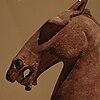Situ (office)
Situ was one of the highest ranking government offices in ancient China. Established in the Western Zhou dynasty, it was originally written as 司土 (pinyin: Sītǔ), meaning Administrator of Land.[1][2]
During the Han dynasty, the title became written with the different characters 司徒 (pinyin: Sītú; lit. 'Administrator of people'), which is translated variously as Minister over the Masses[3] or Excellency over the Masses.[4] It was one of the three most important official posts during the Han dynasty, called the Three Excellencies. The nominal salary for the post was 20,000 dàn (石) of grain.[5]
The title is the origin of the surname Situ.
See also
- Government of the Han dynasty
- Tai Situpa (Grand Situ)
- Translation of Han dynasty titles
References
Citations
Sources
- Bielenstein, Hans (1980). The Bureaucracy of Han Times. Cambridge, England: Cambridge University Press. ISBN 978-0-521-22510-6.
- de Crespigny, Rafe (2007). A Biographical Dictionary of Later Han to the Three Kingdoms (23 – 220 AD). Leiden, South Holland: Brill. ISBN 978-90-04-15605-0.
- v
- t
- e
- Chu–Han Contention (Feast at Swan Goose Gate)
- Lü Clan disturbance
- Rebellion of the Seven States
- Han dynasty in Inner Asia
- Han conquest of Gojoseon
- Southward expansion (Han–Minyue War
- Han conquest of Nanyue
- Han conquest of Dian
- First Chinese domination of Vietnam
- Trung sisters' rebellion
- Second Chinese domination of Vietnam)
- Xin dynasty
- Red Eyebrows and Lulin
- Chengjia
- Disasters of the Partisan Prohibitions
- Way of the Five Pecks of Rice
- Yellow Turban Rebellion
- End of the Han dynasty

- Cai Lun
- Cai Yong
- Ding Huan
- Du Shi
- Hua Tuo
- Liu An
- Liu Xiang
- Liu Xin
- Luoxia Hong
- Sima Tan
- Wang Chong
- Zhang Heng
- Zhang Zhongjing
  | This article related to the history of China is a stub. You can help Wikipedia by expanding it. |
- v
- t
- e
 | This job-, occupation-, or vocation-related article is a stub. You can help Wikipedia by expanding it. |
- v
- t
- e











